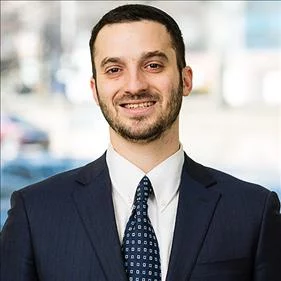Financial adviser turned rabbi uses storytelling to connect with students

Rabbi Daniel Epstein of George Washington University Hillel considers himself to be a professional storyteller — one who knows more than 10,000 tales.
“What do you think is the best story you could tell? The best stories you have are about yourself because they’re your stories,” he said. “No one else has them.”
After a six-year stint as a financial adviser at JPMorgan Chase & Co. in New York City, Rabbi Epstein turned his passion for Judaism into his career. And that’s a story worth telling.
The now 35-year-old developed a thirst for learning Torah at age 3, and by age 9, he had given his first D’var Torah. As a young professional, he continued to study and teach Jewish text, delivering sermons and holding classes at local synagogues, including the shul his father-in-law served as a rabbi.
Encouraged by his mother-in-law to attend rabbinical school, Rabbi Epstein enrolled at Yeshivat Chovevei Torah. After he was ordained in summer 2016, he accepted a position as a senior Jewish educator at GW Hillel.
To engage his students in relatable Jewish conversations each week, Rabbi Epstein teaches about 10 classes, including “Dorm Room Dilemmas.” While noshing on kosher food on Wednesday afternoons, students reference Jewish sources to discuss ethical “dilemmas” on campus, such as ratting out a peer who cheated on a test, stealing pizza from Whole Foods or using mind-altering substances.
“Storytellers don’t tell a lot of stories, they listen,” he said.
And that’s key to understanding students and meeting them where they are physically and mentally. Sometimes that happens in a bustling coffeehouse on campus or in a room tucked away in the GW Hillel building. Other times it occurs in an airport terminal, just hours before students embark on Taglit-Birthright Israel.
Last year, to ease the nerves of some jittery first-time fliers to Israel, Rabbi Epstein explained the Jewish concept of shaliach mitzvah — the idea that a person who is en route to perform a mitzvah merits an extra level of protection.
Prior to boarding the Tel Aviv-bound airplane, he gave each of the students $1 for tzedakah and instructed them to donate it to a charity upon arrival. One of the students then reached into her wallet, handed Rabbi Epstein $1 and said, “Now you’re also protected.”
“There are so many moments like that one — where students think of you,” Rabbi Epstein said. “Those are the moments that make me realize our students are no longer just consumers of Judaism but also producers.”